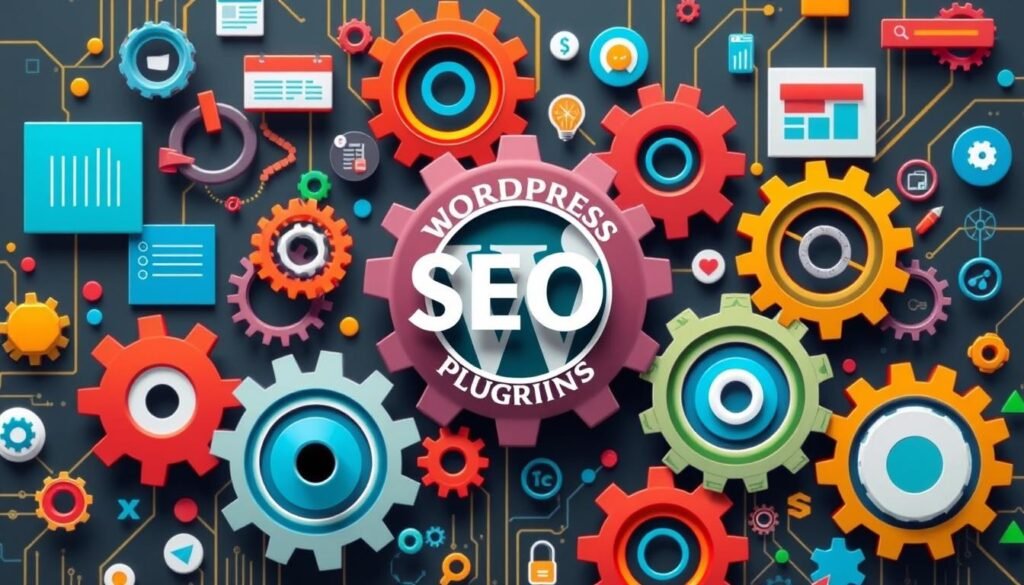Having a strong online presence is key for any business. With over 75 million websites on WordPress, the competition is tough. To stand out, you need a solid SEO strategy.
In this guide, we dive into WordPress SEO services. We’ll explore strategies, tools, and best practices to boost your website’s ranking. We’ll cover everything from search engine algorithms to advanced optimization techniques.
Key Takeaways
- Over 75 million websites are powered by WordPress, indicating high competition for online visibility.
- Effective WordPress SEO strategies can lead to increased organic traffic and improved search rankings.
- Keyword research tools like Google Keyword Planner, SEMrush, and Ahrefs can help identify high-performing keywords.
- WordPress SEO plugins like Yoast SEO, All in One SEO Pack, and Rank Math offer features to aid search engine crawling and optimization.
- Monitoring tools such as Google Analytics and Google Search Console are essential for tracking website performance and user behavior.
Introduction to WordPress SEO
As a WordPress website owner, knowing how vital WordPress SEO is is crucial. It’s the key to unlocking your website’s full potential and driving lots of organic traffic. WordPress SEO services help optimize your site to match search engines like Google’s complex algorithms.
Why WordPress SEO is Crucial
In today’s digital world, standing out online is tough. But with effective WordPress SEO, you can make a big difference. By improving your content, structure, and technical aspects, you boost your site’s search engine visibility and organic traffic generation. This leads to more brand awareness, engagement, and a stronger online presence, helping your business grow.
Understanding Search Engine Algorithms
At the core of WordPress SEO is grasping search engine algorithms. These systems check many factors to see if your site is relevant, authoritative, and trustworthy. By matching your WordPress site with these algorithms, you can improve your search engine rankings and make your content easy for your audience to find.
WordPress SEO covers a wide range of strategies, from keyword research and on-page optimization to technical SEO and content marketing. Mastering these key areas can unlock your WordPress site’s full potential and set it up for success in the digital world.
Keyword Research for WordPress Sites
Keyword research is key to a successful WordPress SEO strategy. It’s not just about finding the right keywords. It’s about knowing what your audience wants and keeping up with search trends. Tools like Google Keyword Planner, SEMrush, and Ahrefs help find valuable keywords with high search volumes and low competition.
Identifying Relevant Keywords
Start by making a list of keywords and phrases that fit your business. Think about both broad keywords and specific long-tail keywords. Long-tail keywords might have lower search numbers but attract more serious buyers and are easier to rank for.
Analyzing User Intent and Search Trends
Keyword research is more than just finding words. It’s about knowing how people search and what they’re looking for. Look at search trends and user intent to make sure your content meets their needs. Keep your keyword strategy up to date to match industry changes and consumer behavior shifts.
By doing thorough keyword research and understanding your audience, you can build a WordPress SEO strategy for lasting success in search rankings.
“Keyword research is the foundation of any successful SEO strategy. It’s the key to understanding your audience and creating content that truly resonates with them.” – SEO Expert, Jane Doe
On-Page Optimization Techniques
Optimizing Titles and Meta Descriptions
Making your titles and meta descriptions catchy is key for on-page optimization. These are the first things people see in search results. Make sure your titles match what’s on the page and include important keywords to get more clicks.
Also, make your meta descriptions short and sweet. They should give a quick summary of what the page is about and why it’s worth visiting.
Structuring Content with Headers
Good content structure is important for both readers and search engines. Use header tags (H1, H2, H3, etc.) to organize your content. This makes it easier to read and understand.
It also helps search engines see the page’s structure and relevance. Don’t forget to add relevant keywords to your header tags to boost your site’s search visibility.
| On-Page Optimization Element | Optimization Strategies |
|---|---|
| Page Titles |
|
| Meta Descriptions |
|
| Header Tags (H1, H2, H3, etc.) |
|
By working on your titles, meta descriptions, and content structure, you can make your WordPress site more visible. This will attract more visitors and keep them engaged.
wordpress seo
As a WordPress user, using search engine optimization (SEO) is key to getting more visitors. WordPress SEO helps your content be found by the right people. It makes your site more visible, leading to more engagement and sales.
WordPress has built-in SEO tools like custom titles and meta descriptions. But to really boost your SEO, you need to explore more techniques and tools.
Leveraging WordPress SEO Plugins
SEO plugins like Yoast SEO are great for improving your site’s search ranking. They offer features like:
- Automated title and meta description generation
- Optimization of content structure with headers (H1, H2, H3)
- Seamless integration of social media profiles
- Real-time feedback on your content’s SEO performance
By using these plugins, you can make your WordPress site more search-friendly. This attracts more visitors and keeps them engaged.
Boosting Organic Traffic through WordPress SEO
Good WordPress SEO can bring more visitors to your site. Focus on keyword research, content optimization, and technical SEO. This improves your site’s ranking in search results, bringing in more qualified visitors.
But, getting top rankings is an ongoing task. You need to keep up with search engine changes and best practices. This ensures your site stays competitive online.
“Investing in WordPress SEO is not just about improving your search rankings; it’s about creating a robust online presence that resonates with your target audience and drives meaningful business growth.”
In conclusion, WordPress SEO is crucial for a strong online presence and attracting visitors. By using the right tools and techniques, you can make your WordPress site a leader in your field.
Technical SEO for WordPress
Technical SEO is key to your website’s success in search engines. It boosts your site’s speed, reduces plugins, optimizes images, and uses browser caching. Also, making your site mobile-friendly is vital, as Google favors mobile-friendly sites.
Enhancing Website Speed
Website speed is crucial for rankings and user experience. Optimizing your WordPress site’s technical aspects can greatly improve its speed. Here are some strategies:
- Reduce plugins and deactivate unused ones.
- Compress and optimize images to save space without losing quality.
- Use browser caching to store resources on the user’s device.
- Set up a Content Delivery Network (CDN) to serve content closer to visitors.
Optimizing for Mobile Devices
In today’s mobile world, making your WordPress site mobile-friendly is essential. Google’s Mobile-Friendly Test tool can spot and fix mobile issues. Here are some tips for mobile optimization:
- Use responsive design that fits all screen sizes.
- Implement accelerated mobile pages (AMP) for a quick mobile experience.
- Optimize images, videos, and media for smaller screens and slower connections.
- Make sure your site’s navigation and interface are easy to use on mobile.
By focusing on technical SEO like speed and mobile optimization, you can boost your WordPress site’s performance. This will improve your search engine ranking and drive more traffic and conversions.
| Technical SEO Metric | Benchmark | Impact on Performance |
|---|---|---|
| Page Load Time | Less than 3 seconds | A 1-second delay in page load time can result in a 7% reduction in conversions. |
| Mobile-Friendly Score | 90% or higher | Over 60% of Google searches now originate from mobile devices, making mobile optimization crucial. |
| XML Sitemap Configuration | Updated regularly | A well-structured XML sitemap improves crawlability and indexing, enhancing overall SEO efforts. |
Content Creation and Marketing
Making great content is more than just writing blog posts. It’s about sharing valuable info that speaks to your audience. Knowing your audience well is key to creating content they’ll love.
Developing a Content Strategy
Try out different content types like videos and podcasts to keep things fresh. Always post high-quality content that shows you know your stuff. This attracts more visitors and builds trust with your readers.
Promoting and Distributing Content
It’s important to share your content far and wide. Use social media, email, and guest posts to reach more people. Working with influencers can also help spread the word. Plus, sharing your content in various ways can reach even more folks.
| Content Marketing Metrics | Percentage |
|---|---|
| Track metrics and understand how content is performing | 51% |
| Do not understand how content is performing | 49% |
| Track metrics but don’t know how content is performing | 32% |
| Not tracking metrics | 9% |
| Do not know if metrics are tracked | 8% |
By combining content creation, strategy, and sharing, you can boost your online presence. The goal is to make content that truly connects with your audience. This way, you can attract more visitors and grow your brand.

“Content marketing is the process of planning, creating, and distributing relevant content with the intent of attracting and engaging a specific audience.”
Link Building for WordPress Sites
In the world of SEO, link building is key for WordPress sites. Getting backlinks from trusted sites in your field boosts your site’s authority. This helps improve your site’s ranking in search results.
Building relationships with other site owners and influencers is a good strategy. You can do this through networking, guest blogging, and sharing valuable content. This approach earns you quality backlinks and builds a community in your niche.
Remember, quality links are more important than quantity. A few high-quality, relevant backlinks can do more for your site than many low-quality ones. Stay away from black hat link-building tactics like buying links. These can hurt your site’s reputation and lead to penalties from search engines.
| Link Building Strategies | Benefits |
|---|---|
| Guest Blogging | Earn backlinks from reputable industry websites, increase brand visibility, and establish yourself as an expert in your field. |
| Influencer Outreach | Collaborate with industry influencers to create valuable content and tap into their established audience, gaining backlinks and increased exposure. |
| Content Marketing | Produce link-worthy content that others will naturally want to share and link to, boosting your off-page SEO efforts. |
By using ethical, white-hat link-building strategies, you can improve your site’s authority. This will make your site more visible in search results. More traffic and potential customers will come to your WordPress website.
“The key to successful link building is to focus on quality, not quantity. Earn backlinks from reputable, relevant sources, and you’ll see a lasting positive impact on your site’s SEO.”
Leveraging WordPress SEO Plugins
As a WordPress user, I’ve learned how great the platform’s plugins are. They offer many tools to make my site better. SEO plugins are especially helpful, making it easier to improve my site’s search ranking.
Exploring Popular SEO Plugins
Yoast SEO and All in One SEO Pack are top choices for WordPress users. They make SEO easy with their strong features. Rank Math is also popular, known for its effectiveness.
These plugins create XML sitemaps automatically. Sitemaps help search engines find and index my site’s pages. This means more of my content shows up in search results, helping more people find me.
Configuring Plugin Settings
Getting the most out of these plugins means setting them up right. Each offers many customization options. I can adjust everything from titles and descriptions to URLs and redirects.
Using WordPress SEO plugins like Yoast SEO, All in One SEO Pack, and Rank Math has helped me a lot. They’ve made my SEO work easier, increased my site’s visibility, and brought more visitors to my content. These plugins are key to reaching my SEO goals.

Monitoring and Analyzing SEO Performance
Keeping your WordPress website successful means always checking and improving your SEO. This ongoing effort helps you find valuable insights. These insights guide your optimization and help your website grow.
By tracking your website’s performance, you can spot chances to improve. You can then refine your strategies. This leads to better visibility online.
Leveraging Google Analytics and Search Console
Google Analytics and Google Search Console are key tools for SEO. Google Analytics shows you website metrics like traffic sources and user behavior. It helps you see what’s working and what needs work.
Google Search Console gives you insights into your site’s search engine performance. It tracks keyword rankings and site health. This helps you make smart SEO choices.
Using both tools together gives you a full view of your SEO. You can make decisions based on real data. This leads to better results for your website.
| Metric | Importance |
|---|---|
| Organic Traffic | Shows how well your SEO attracts quality visitors. |
| Keyword Rankings | Tells you how visible your site is in search results. |
| Click-Through Rate (CTR) | Helps you make your search listings more appealing. |
| Bounce Rate | Shows how engaging your content is. |
| Conversion Rate | Measures how well your SEO turns visitors into actions. |
Watching these key metrics helps you understand your SEO. You can make informed decisions. This leads to better strategies for your website’s future.
Advanced WordPress SEO Strategies
As a WordPress fan, I’ve learned a lot about SEO. There are many ways to make your site better in search engines. One key method is using schema markup. It gives search engines detailed info about your web pages.
Implementing Schema Markup
Adding schema markup to your WordPress site can make your content stand out. It shows up as rich snippets in search results. These snippets can include things like star ratings and prices, helping more people find your site.
Using SEO plugins like Yoast SEO makes adding schema markup easy. It’s a simple way to improve your site.
Optimizing for Voice Search
Voice search is becoming more popular, and WordPress sites need to adapt. With tools like Google Assistant and Amazon Alexa, your content should answer questions and be easy to find. Make sure your site works well on mobile devices too.
SEO is all about using different strategies to get better results. By trying out schema markup and voice search, you can lead in your field.
“Implementing schema markup and optimizing for voice search can be game-changers for WordPress SEO, driving more traffic and engagement to your site.”
Conclusion
Mastering WordPress SEO is key for your website’s long-term success. It helps increase visibility and organic traffic. By optimizing content and using powerful plugins, you can grow your site sustainably.
Following the guide’s tips will help you rank higher in search engines. Your WordPress site will become a trusted leader in your field. SEO is a long-term effort. Stay consistent, patient, and ready to adapt to changes.
Keep learning and using tools like the Blog Post Conclusion AI tool from Content AI. It can make your WordPress SEO work easier. With the right plan, WordPress can help you attract more quality traffic and meet your business goals.






